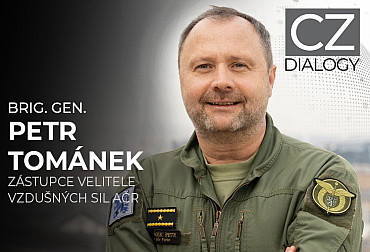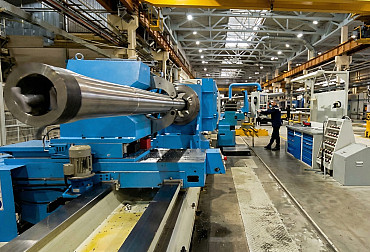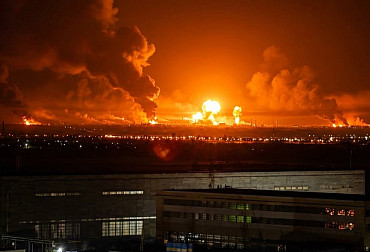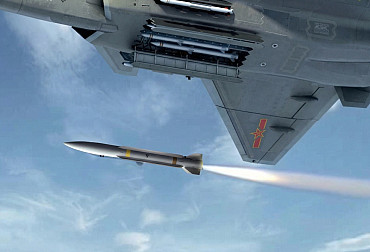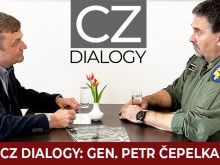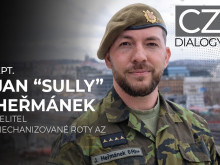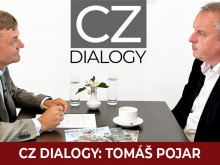Gen. Radek Hasala: I perceive the role of active reserves as very important, I bow to them
The Military Office of the President of the Republic is a special unit of the Armed Forces of the Czech Republic. Its chief, Major General Radek Hasala, has basically two main tasks. The first is to support the President of the Republic as Commander-in-Chief of the Armed Forces, and the second is to manage and control the Castle Guard. And what does it mean to support the President as Commander-in-Chief of the Armed Forces? It is the preparation of various documents (for the appointment of generals, for the appointment of rectors of military universities, preparation for meetings of the BIS, the State Security Council, etc.) This is not the only thing we talked about in the next episode of our discussion programme CZ DIALOGY with the Chief of the Military Office of the President of the Republic, Major General Radek Hasala.
Video: Interview with Major General Radek Hasala, Chief of the Military Office of the President of the Republic / CZ DEFENCE
The President of the Republic is the Commander-in-Chief of the Armed Forces of the Czech Republic and the Military Office helps him to fulfil this function. And it is not only about the aforementioned appointment of the Chief of the General Staff of the Czech Armed Forces on the basis of a proposal from the government or rectors of military schools. As the Commander-in-Chief of the Armed Forces, the President can participate in any meetings concerning the Armed Forces of the Czech Republic and must be informed about the situation in the Armed Forces of the Czech Republic, which is why, according to General Hasala, President Petr Pavel's previous military experience is definitely an advantage. "Of course, the President has an overview of what is happening in the Armed Forces, what is happening in the Czech Army, what the tasks are here and what the needs of the Czech Army are. So he can orient himself very quickly, not only in terms of the Army of the Czech Republic, but also in terms of the international and security situation," General Hasala said.
Of course, the President of the Republic is not only concerned with the army and the armed forces. "I must say that his schedule often ends in the evening, often over the weekend, and includes various visits and meetings. So the time that is devoted to the agenda of the armed forces is rather minor," Radek Hasala adds. Among the visible activities of the military office under the previous president, Miloš Zeman, was, for example, agreeing to the departure of some Czech citizens to help the Ukrainian army. According to General Hasala, the military office no longer handles nearly as many requests as it did at the beginning of the war. The biggest boom was just at the beginning of this aggression, i.e. last year. "Rather, at the Military Office of the President of the Republic we deal with various queries and search through archives. We answer various requests and questions from citizens and journalists," explains General Hasala.
We were also interested in the apparent relaxation of certain security measures at Prague Castle. "I would say it is a change in the access regime. What has changed? The controls that are in place at the entrance have changed, and they have changed based on the evolution of the security situation. This was not only at the decision of the President of the Republic or the Chancellor, but of course the Police of the Czech Republic and other forces that were assessing the security situation also commented on it," explains General Hasala, adding that the regime of controls at the entrances has been reduced: "However, the entrance is still monitored by the Police of the Czech Republic. Random checks are carried out if a police officer suspects that a certain person might be dangerous to other visitors. The focus of control has shifted more to the Prague Castle grounds, specifically by conducting mixed patrols in the individual courtyards, where these patrols consist of one police officer and one member of the Castle Guard."
The Military Office follows the instructions of the President of the Republic, but also the Minister of Defence. General Hasala took office in April this year with the new President, and we wondered whether the terms of cooperation between the Ministry of Defence and the Office of the President of the Republic had to be re-set in any way? "I would not say that I would set up the cooperation with the ministry differently. I participate in consultations with the Minister of Defence, the Planning Council and I also participate in meetings at the General Staff, such as the General Councils and so on. The reason for this is to ensure the flow of information when it is necessary to inform the President about some important matters, or, on the contrary, to transfer a message from the President to the leadership of the ministry, this is also the role of the Chief of the Military Office," explains Radek Hasala.
Given Major General Hasala's extensive previous experience, we wondered to what extent he would use this in his new position. "What has always worked well for me is to try to get along, to try to be open and to try to build communication and cooperation with my colleagues in a way that is mutually beneficial. That said, there always needs to be trust between co-workers and there needs to be openness. And this has worked well for me in all my positions, even in a foreign post," General Hasala said.
The danger of an open war conflict directly affecting the Czech Republic has been discussed more intensively in our country, both by security analysts and representatives of the army and the Ministry of Defence. At the moment of such a situation, which no one would wish, the activities of the President's military office would also change. "The first would be, of course, the security of the President's residence. If the security situation were to deteriorate, a number of measures would have to be taken to secure this function. Next, of course, would be to support the President as Commander-in-Chief of the armed forces. This means that this activity would be intensified. The President would participate more often in meetings of, for example, the State Security Council, so the preparation of documents would have to be ensured, information would be gathered, and closer cooperation would be established with the leadership of the ministry and the Army of the Czech Republic. It would be in a more intensive mode," explains General Hasala.
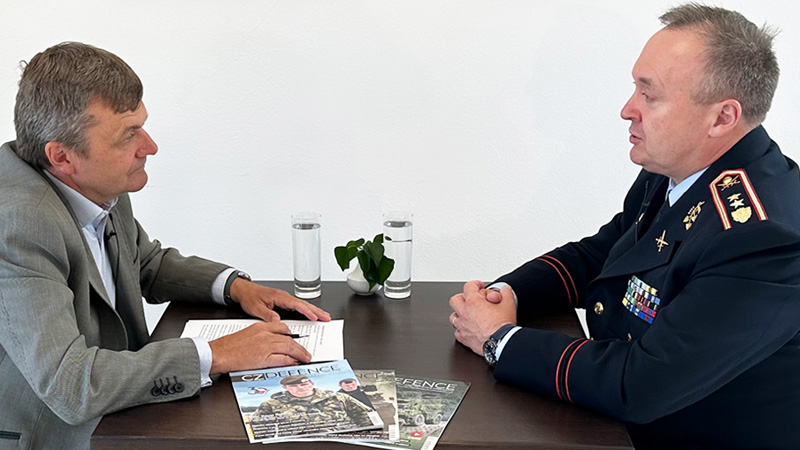 Picture: In this episode of our discussion show CZ DIALOGY, we talked with the Chief of the Military Office of the President of the Republic, Major General Radek Hasala | Michal Pivoňka / CZ DEFENCE
Picture: In this episode of our discussion show CZ DIALOGY, we talked with the Chief of the Military Office of the President of the Republic, Major General Radek Hasala | Michal Pivoňka / CZ DEFENCE
In his military career, Major General Radek Hasala was also the commander of the Training Command-Military Academy in Vyškov. Therefore, in the context of growing threats, the question arises whether the ambition of the personnel development of the Czech Armed Forces to reach 30,000 professional soldiers and 10,000 active reservists by 2030 is a realistic expectation. "Of course the ambition is quite high. I don't think it would be a problem to accept and train that increased number of applicants. The recruitment system, and this is my experience as well, is quite flexible. We faced an increased demand for both active reserve and Czech Army recruits just after the Russian aggression, and the Training Command responded by setting up new courses and increasing our capacity. Of course, the recruitment and selection process was also relatively accelerated," says General Hasala, who sees the problem more in the increased need to replenish the numbers of soldiers. "Because the larger the numbers, the more we will need to replenish those numbers every year. And I'm not sure that as time goes on, the interest in joining the Army and the active reserves will continue. So rather than the problem of recruiting and training these people and putting them in units, I see the problem as one of recruiting potential," Maj. Gen. Radek Hasala said.
A sufficient number of soldiers in the active reserve is also an important element for maintaining the army's capabilities. "I personally see the role of the active reserves as very important. They are the first in line in the event of a deterioration of the security situation. They are the first to be called up. They are then used to create new units, but at the same time many of them decide to become members of the Czech Army during their time there. They are prepared and highly motivated. Whenever I had the opportunity to meet active reservists, I was completely fascinated by their conviction, their desire to be equal to professional soldiers. I bow before them," said Major General Radek Hasala, Chief of the Military Office of the President of the Republic.
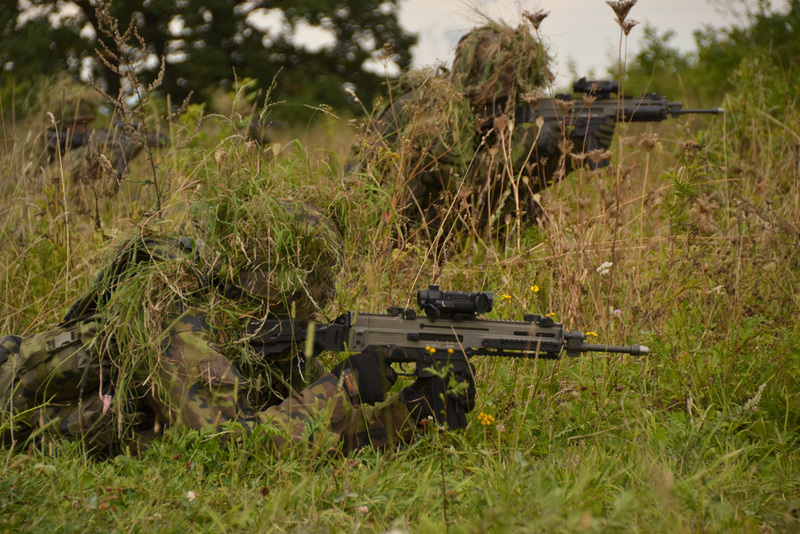 Picture: Whenever I had the opportunity to meet active reservists, I was always fascinated by their conviction, their desire to be equal to professional soldiers. | AZ 41. mpr
Picture: Whenever I had the opportunity to meet active reservists, I was always fascinated by their conviction, their desire to be equal to professional soldiers. | AZ 41. mpr
If you would like to learn about General Hasala's personal experiences from foreign missions, his time at the NATO Force Headquarters in Brussels, or the connection between the professional army and the civilian population, listen to the full interview at the beginning of this article.











